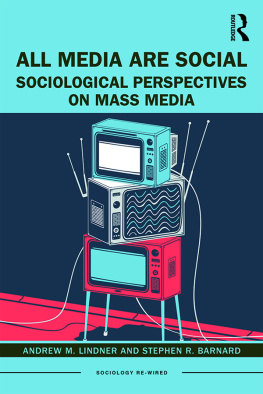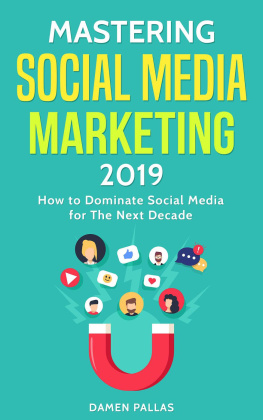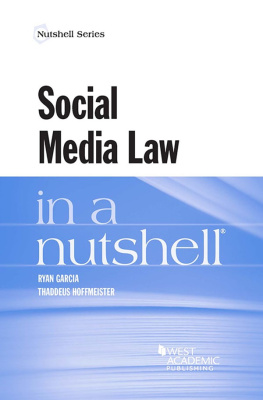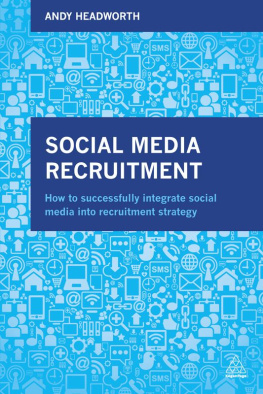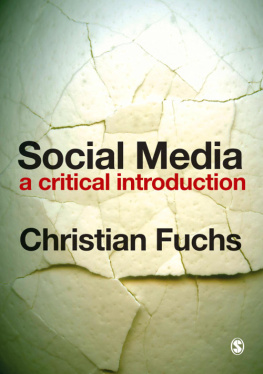All Media Are Social
From TV to smartphone apps to movies to newspapers, mass media are nearly omnipresent in contemporary life and act as a powerful social institution. In this introduction to media sociology, Lindner and Barnard encourage readers to think critically about the power of big media companies, state-media relations, new developments in journalism, representations of race, class, gender, and sexuality in media, and what social media may or may not be doing to our brains, among other topics. Each chapter explores pressing questions about media by carefully excavating the results of classic and contemporary social scientific studies. The authors bring these findings to life with anecdotes and examples ripped from headlines and social media newsfeeds. By synthesizing research on new media and traditional media, entertainment media and news, quantitative and qualitative studies, All Media Are Social offers a succinct and accessibly-written analysis of both enduring patterns and some of the newest developments in mass media. With strong emphases on theory and methods, Lindner and Barnard provide students and general readers alike with the tools to better understand the ever-changing media landscape.
Andrew M. Lindner is Associate Professor of Sociology at Skidmore College in Saratoga Springs, NY. He studies the intersection of culture, mass media, and politics. His research has appeared in publications including New Media & Society, Social Problems, and Information, Communication, & Society.
Stephen R. Barnard is Associate Professor at St. Lawrence University in Canton, NY. His research and teaching focus on the role media and communication technologies play in relations of power, practice, and democracy. He is author of Citizens at the Gates: Twitter, Networked Publics, and the Transformation of American Journalism.
Sociology Re-Wired
Edited by Jodi OBrien and Marcus Hunter
Seattle University and University of California, Los Angeles
Sociology Re-Wired captures this combustible moment in American and global societies with new books that innovate and re-configure social and political issues. This hybrid series publishes timely, relevant, original research and textbooks that address significant social issues informed by critical race theory, Black feminism and Queer Studies traditions. Series books are written in a publicly accessible, multi-vocal style broadening the reach and impact of significant scholarly contributions beyond traditional academic audiences.
Some titles published in this series were published under an earlier series name and a different editorship.
Published:
Social Statistics: Managing Data, Conducting Analyses, Presenting Results, Third Edition by Thomas J. Linneman
Who Lives, Who Dies, Who Decides?: Abortion, Assisted Dying, Capital Punishment, and Torture, Third Edition by Sheldon Ekland-Olson
Caged Women: Incarceration, Representation, & Media edited by Shirley A. Jackson and Laurie L. Gordy
The New Black Sociologists: Historical and Contemporary Perspectives edited by Marcus A. Hunter
The Black Circuit: Race, Performance, and Spectatorship in Black Popular Theatre, by Rashida Z. Shaw McMahon
All Media Are Social: Sociological Perspectives on Mass Media by Andrew M. Lindner and Stephen R. Barnard
First published 2020
by Routledge
52 Vanderbilt Avenue, New York, NY 10017
and by Routledge
2 Park Square, Milton Park, Abingdon, Oxon, OX14 4RN
Routledge is an imprint of the Taylor & Francis Group, an Informa business
2020 Taylor & Francis
The right of Andrew M. Lindner and Stephen R. Barnard to be identified as authors of this work has been asserted by them in accordance with sections 77 and 78 of the Copyright, Designs and Patents Act 1988.
All rights reserved. No part of this book may be reprinted or reproduced or utilised in any form or by any electronic, mechanical, or other means, now known or hereafter invented, including photocopying and recording, or in any information storage or retrieval system, without permission in writing from the publishers.
Trademark notice: Product or corporate names may be trademarks or registered trademarks, and are used only for identification and explanation without intent to infringe.
Library of Congress Cataloging-in-Publication Data
A catalog record for this title has been requested
ISBN: 978-0-415-74953-4 (hbk)
ISBN: 978-0-415-74954-1 (pbk)
ISBN: 978-1-315-79605-5 (ebk)
For Beth
-A.L.
For Grumps
-S.B.
In July of 1964, Paul McCartney strummed out the chords for an uptempo new tune on a jangly acoustic guitar. With its warm sound in D major and the optimistic chorus of we can work it out, the song exemplifies McCartneys sunny disposition and pop sensibility. When McCartney brought his early draft to the studio, John Lennon proposed adding a darker section in B minor with the bleak lyric, life is very short. The resulting song, We Can Work It Out, presents a study of contrasts between Vaudeville versions of cheery Paul and cynical John. But, somehow, the song comes across not as disjointed, but as a cohesive whole that is greater than the sum of its parts.
Neither of the two authors of this book is a lyrical visionary like Lennon nor has the melodic genius of McCartney. Still, like many pairs of collaborators, we brought different abilities and perspectives to the task of writing this book a qualitative researchers attention to meaning, a quantoids obsession with measurement. It is our hope that the book strikes the reader as a harmonious text, but what is certainly true is that it is a better book than either of us could have written alone. For this reason, we first want to acknowledge our appreciation of each others contributions in researching, writing, and re-writing this book.
There is another Beatles song that is so frequently mentioned in book acknowledgments sections as to be a clich. We wont mention it. However, this book came to be with an extraordinary amount of support from our colleagues, family, and friends. Sociologist, champion of public sociology, and professional good guy, Doug Hartmann, initiated the conversations that led to this project. Steve Rutter, Social Sciences Publisher for Routledge, supported the book in its early days, even when it ended up taking much longer than expected. Finally, Dean Birkenkamp, senior editor at Routledge, has shepherded the book to publication. Together, we thank Doug, Steve, and Dean for supporting this project. Additionally, we extend our deep appreciation to the many academic colleagues whose intellectual contributions are reflected in the pages of this book. Lend us your ears and well try not to sing out of key.
If the insight of stratification is sociologys primary contribution to the world, as some have argued, Id have to be a real ingrate to spend my days teaching sociology and not recognize the immense advantages I have had in this life. That starts with my parents, Eileen and John Lindner, who have supported me in innumerable ways, but who also passed on to me their love of learning and passion for justice. I have also been the beneficiary of the love and support of my brother, Peter Lindner, and his family, as well as the extended Van Velsor family. For all of this, I am deeply and forever grateful. I also feel lucky to have a stupendous group of friends and colleagues who have shown an ongoing solidarity and at least a partial willingness to hear out the bad first version of my ideas. Thank you to Dan Hawkins, Jason Houle, Matthew Marlay, Ed Walker, Ryan Larson, Jenni Mueller, Amon Emeka, Dominique Vuvan, Susan Walzer, and many others. In writing this book, I have been grateful for thoughtful and critical feedback on the proposal and chapter drafts from John Brueggemann, Matthew Lindholm, Andreas Rekdal, and Brianna Cochran. At the risk of sounding terribly maudlin, the next rounds on me. Finally, and most importantly, I thank my wife and best friend, Beth Van Velsor, for your support, encouragement, and love across nearly two decades, six states, and two continents.

